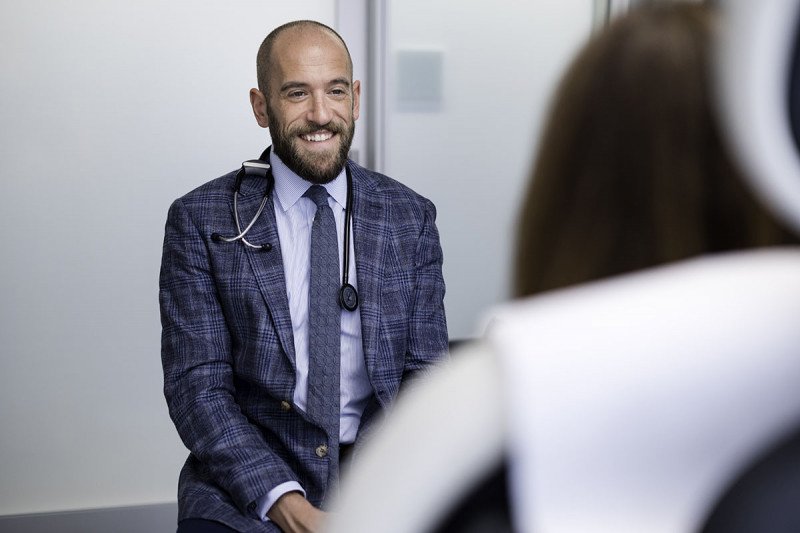
Histiocytosis (HIS-tee-oh-sy-TOH-sis) is a family of rare diseases that affect only a few hundred people each year in the United States.
A type of white blood cell that is made in the bone marrow.
It starts when the body makes too many white blood cells called histiocytes. These cells normally help the immune system absorb and remove bacteria and other things.
When you have histiocytosis, histiocytes can build up and form tumors in any part of your body. They most often grow in the bones and skin.
Doctors at MSK care for more adults with histiocytosis than any other hospital in the country. Our MSK Kids team is very experienced at caring for children with this disease.
About MSK’s guide to histiocytosis
This guide can support you and your loved ones as you learn more about histiocytosis. We share expert information about histiocytosis and the latest treatments. We have information about histiocytosis research studies, also known as clinical trials, that you may be able to join.
Who is this disease guide for?
-
You’re waiting to learn if you have histiocytosis
This guide gives you information about histiocytosis so you’re better prepared. If you want to know right away if you have histiocytosis, we have information about MSK’s rapid diagnosis program. -
You want a second opinion
This guide explains new treatments. Learning about them can help you decide if you want a second opinion. MSK’s histiocytosis experts offer second opinions about both diagnosis and treatment options, no matter where you live. -
You’re worried about your current treatment plan
This guide can help you learn about other treatment options. MSK experts only use the latest treatments for histiocytosis, some only offered at MSK and very few other hospitals. -
You’re a caregiver to someone who has histiocytosis
This guide has information about how to support a loved one who has cancer, even if they’re not an MSK patient. At MSK, supporting caregivers is as important as caring for people with cancer.
How many types of histiocytosis are there?
There are many kinds of histiocytosis. Some forms can be mild, while others can be very bad. Some types of histiocytosis are more common in some age groups than others. Learn more about the types of histiocytosis.
In 2017, MSK made a registry for people with a form of histiocytosis called Erdheim-Chester disease (ECD). It now includes all types of histiocytosis and is the only registry of its kind in the country. Registry studies are powerful tools we use to study rare diseases and improve their treatment.
Histiocytosis signs and symptoms
The symptoms of histiocytosis often are the same as those of other diseases. This can make it hard to diagnosis. Common symptoms are:
- Fever
- Pain
- Rashes
Histiocytosis often affects certain areas. Here are the symptoms for those places:
- Skin. Histiocytosis in the skin can cause rashes. They look like red, yellow, or purplish patches or bumps. They can be painful or itchy.
- Bones. Histiocytosis tumors in bones that bear weight can be very painful and make the bones break.
- Sinuses and eyes. Histiocytosis tumors near the sinuses can cause discomfort behind the face. Tumors around or behind the eyes can lead to vision problems or bulging eyes.
- Brain. Histiocytosis in the brain can cause trouble with balance, hormonal imbalances, headaches, weakness, less sensation (feeling), and trouble thinking.
- Internal organs. Histiocytosis tumors in the kidneys, liver, spleen, lungs, lymph nodes, or other organs cause swelling. They can affect how well organs work.
Why get treatment for histiocytosis at a cancer center?
Researchers recently learned that histiocytosis is caused by gene changes (mutations or variants). The research showed that histiocytic diseases are neoplastic, or cancerous, blood diseases. That’s why they’re treated by cancer experts.
Histiocytosis treatments include chemotherapy drugs and targeted medicine that also is used to treat other cancers.
Why should I choose Memorial Sloan Kettering to treat histiocytosis?
- Experience. Doctors at MSK care for more adults with histiocytosis than any other hospital in the nation. Our MSK Kids team is very experienced at caring for children with this disease.
- The right diagnosis. We’re experts in spotting the symptoms of histiocytosis and making an accurate diagnosis. A correct diagnosis is very important to getting the best treatment.
-
New treatments. Our experts played key roles in the research on 2 important histiocytosis medications. This research led to approval of the drugs by the U.S. Food and Drug Administration (FDA). The drugs are vemurafenib (Zelboraf®) and cobimetinib (Cotellic®).
For some people, new histiocytosis treatments aimed at gene mutations improved their symptoms and overall health. MSK assessed some of these treatments during research studies, also known as clinical trials. - Research excellence. MSK offers all standard treatments as well as histiocytosis clinical trials. Our research explores treatments available only at a few hospitals, including MSK.
- Supportive care. We offer supportive care to help you cope with histiocytosis. We treat the side effects of histiocytosis therapy, and have services to care for your emotional and spiritual needs.
We’re available 24 hours a day, 7 days a week
Learn about our Health Information Policy.